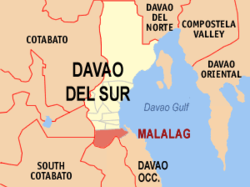Malalag, Davao del Sur
| Malalag | |
|---|---|
| Municipality | |

Municipal Hall of Malalag
|
|
 Map of Davao del Sur with Malalag highlighted |
|
| Location within the Philippines | |
| Coordinates: 06°36′N 125°24′E / 6.600°N 125.400°ECoordinates: 06°36′N 125°24′E / 6.600°N 125.400°E | |
| Country | Philippines |
| Region | Davao (Region XI) |
| Province | Davao del Sur |
| District | 2nd district of Davao del Sur |
| Founded | May 28, 1953 |
| Barangays | 15 |
| Government | |
| • Mayor | Peter Paul T. Valentin |
| Area | |
| • Total | 186.12 km2 (71.86 sq mi) |
| Population (2015 census) | |
| • Total | 38,731 |
| • Density | 210/km2 (540/sq mi) |
| Time zone | PST (UTC+8) |
| ZIP code | 8010 |
| IDD : area code | +63 (0)82 |
| Income class | 2nd municipal income class |
| 112408000 | |
| Electorate | 21,303 voters as of 2016 |
| Website | www |
Malalag is a 2nd class municipality in the province of Davao del Sur, Philippines. According to the 2015 census, it has a population of 38,731 people.
Malalag is the agricultural center of Davao del Sur, and its main products are banana, coconut and other fruits and vegetables. Other primary industries include fishing and mining.
Malalag is politically subdivided into 15 barangays.
Malalag derives its name from the color that describes the river running within the heart of the town. The water flowing towards the bay appeared yellowish. The natives referring to the river called it, “malalag nga tubig”, meaning “yellow water.” The distinct appearance of the river attracted migrants to the place.
Some pioneers trace the town's name from a disagreement between a Spanish soldier and Datu Alag, a famous chieftain among the early tribes. It was said that Datu Alag made an appointment with the Spaniard and promised him to be his guide. However, Datu Alag broke his promise and not one of his followers could tell where he has gone. Sensing that he had somehow been tricked, the Spanish soldier became enraged and shouted, “Mal Alag, Mal Alag.” (Bad Alag!) The tribe members confounded by his words kept on repeating it. The same story was told over the generations, so that even settlers coming from Visayas and Luzon became accustomed to calling the place Malalag.
Malalag Bay was previously known as Casilaran Bay, The name Malalag was applied to it some time during the Second World War after a Philippine National Police (PNP) barracks was established. The same area, now known as Crossing Baybay and adjacent to the 434th PNP Mobile Force Company barrack, was a center of commerce with Chinese traders. Also, the Malalag Wharf that is located about a kilometer away used to accommodate three to four sea vessels that loaded products for transport to Visayas.
...
Wikipedia

